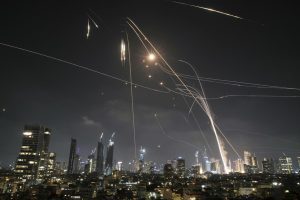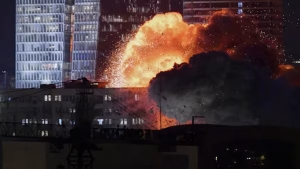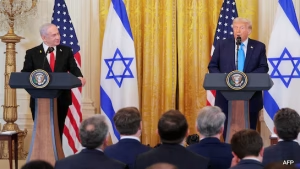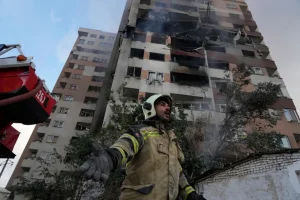New Delhi – The Middle East witnessed one of its most dangerous escalations in years as Israel strikes Iran in a coordinated military operation, triggering immediate and severe retaliation from Tehran. The dramatic events unfolded over Friday night and early Saturday morning, marking a critical turning point in regional tensions.
Operation Rising Lion: Israel’s Preemptive Strike
Israel strikes Iran under what Israeli forces dubbed “Operation Rising Lion,” a comprehensive military campaign targeting Iran’s nuclear infrastructure and military installations. The overnight airstrikes caught Iranian forces by surprise, representing one of the most significant direct military confrontations between the two nations.

Israeli Prime Minister Benjamin Netanyahu justified the operation by stating that intelligence indicated Iran’s nuclear program had reached a critical “point of no return.” The strikes specifically targeted nuclear facilities, ballistic missile factories, and key military capabilities across Iranian territory.
The scope of Israel strikes Iran was extensive, with multiple sites hit simultaneously. According to Netanyahu, “In recent years, Iran has produced enough highly enriched uranium for nine atom bombs,” highlighting the urgency behind Israel’s decision to act preemptively.
Devastating Impact on Iranian Leadership


The consequences of Israel strikes Iran were immediately apparent as the attacks resulted in significant casualties among Iran’s military leadership. The strikes killed several high-ranking commanders, including the chief of Iran’s Revolutionary Guards, Hossein Salami, and the chief of staff of Iran’s armed forces, General Mohammad Bagheri.
Also Read: Israel Conducts Airstrikes on Tehran: Breaking 48 Hours Of State of Emergency Declared
Six nuclear scientists also perished in the attacks, dealing a severe blow to Iran’s nuclear program infrastructure. The targeting of both military leadership and scientific personnel indicates the strategic nature of the Israeli operation, designed to cripple Iran’s military and nuclear capabilities simultaneously.
Iran’s Massive Retaliation Campaign


Iran’s response to Israel strikes Iran was swift and overwhelming. Tehran launched over 100 drones and multiple missiles targeting various locations across Israel, marking one of the largest direct attacks on Israeli territory in recent history. The Iranian assault represented a significant escalation from previous proxy conflicts to direct military confrontation.
Israeli defense systems worked overtime to intercept the incoming threats, with officials claiming to have successfully neutralized most drones outside Israeli borders. However, the sheer volume of the attack demonstrated Iran’s determination to respond forcefully to the Israeli strikes.
Air raid sirens wailed across multiple Israeli cities, including Tel Aviv, where residents rushed to bomb shelters as the country braced for continued attacks. The Israeli military detected additional missiles from Yemen, indicating the potential for a broader regional conflict.
Regional Airspace Closure and Security Measures

Following Israel strikes Iran and the subsequent retaliation, both nations implemented immediate security measures. Israeli authorities began evacuations in areas that sustained damage, while air traffic controllers closed airspace over both countries to prevent civilian casualties.
The closure of regional airspace highlighted the severity of the situation, as commercial flights were diverted and international travel disrupted. Smoke was observed rising from Chitgar, a neighborhood in western Tehran, providing visual evidence of the strike’s impact.
International Response and Diplomatic Concerns
The escalation prompted immediate international concern as Israel strikes Iran threatened regional stability. The United States clarified its position, with Secretary of State Marco Rubio stating that the strikes were Israel’s “unilateral” action and that America was not directly involved in the offensive operations.

However, reports suggested American involvement in defensive measures, particularly in intercepting Iranian drones on behalf of Israel. The U.S. government emphasized protecting American forces in the region as its top priority while distancing itself from the offensive strikes.
UN leadership called for maximum restraint from both sides, while China expressed deep concerns over the deteriorating situation. France joined the chorus of nations urging both countries to avoid further escalation that could undermine regional stability.
Leadership Statements and Future Implications


Israeli Defense Minister Israel Katz warned of expected retaliation following Israel strikes Iran, stating that missile and drone attacks against Israel were anticipated “in the immediate timeframe.” This prescient warning proved accurate as Iran launched its massive retaliatory strike.
Netanyahu characterized the operation as necessary for Israel’s survival, declaring that Israel strikes Iran aimed “to roll back the Iranian threat to Israel’s very survival.” He emphasized that the operation would continue “for as many days as it takes to remove this threat.”
Iranian Supreme Leader Ayatollah Ali Khamenei responded with stern warnings, promising that Israel would face a “bitter and painful fate” for its actions. Khamenei’s statement suggested that Iran’s retaliation would extend beyond the immediate missile and drone attacks.
Strategic Military Analysis
The precision and scope of Israel strikes Iran demonstrate sophisticated intelligence gathering and military planning. The simultaneous targeting of nuclear facilities, military installations, and key personnel suggests months of preparation and coordination.
Israel’s ability to penetrate Iranian airspace and strike multiple targets indicates advanced military capabilities and potentially compromised Iranian air defense systems. The success of these strikes may encourage further Israeli operations if diplomatic solutions prove elusive.
Escalation Concerns and Regional Impact


As Israel strikes Iran continues to dominate international headlines, regional allies and adversaries are reassessing their positions. The direct military confrontation between two major Middle Eastern powers threatens to draw in other nations and proxy groups.
The involvement of Yemen in launching missiles toward Israel suggests that Iran’s regional allies are prepared to participate in the broader conflict. This development raises concerns about a multi-front war that could destabilize the entire Middle East region.
Closing Statements
The dramatic events following Israel strikes Iran represent a watershed moment in Middle Eastern geopolitics. The transition from proxy conflicts to direct military confrontation between Israel and Iran has created an extremely volatile situation with far-reaching implications.
As both nations maintain their positions and international mediators work to prevent further escalation, the coming days will be crucial in determining whether this crisis can be contained or will spiral into a broader regional war. The success of Israel strikes Iran in achieving its strategic objectives while managing the inevitable retaliation will define the future of Middle Eastern security dynamics.

